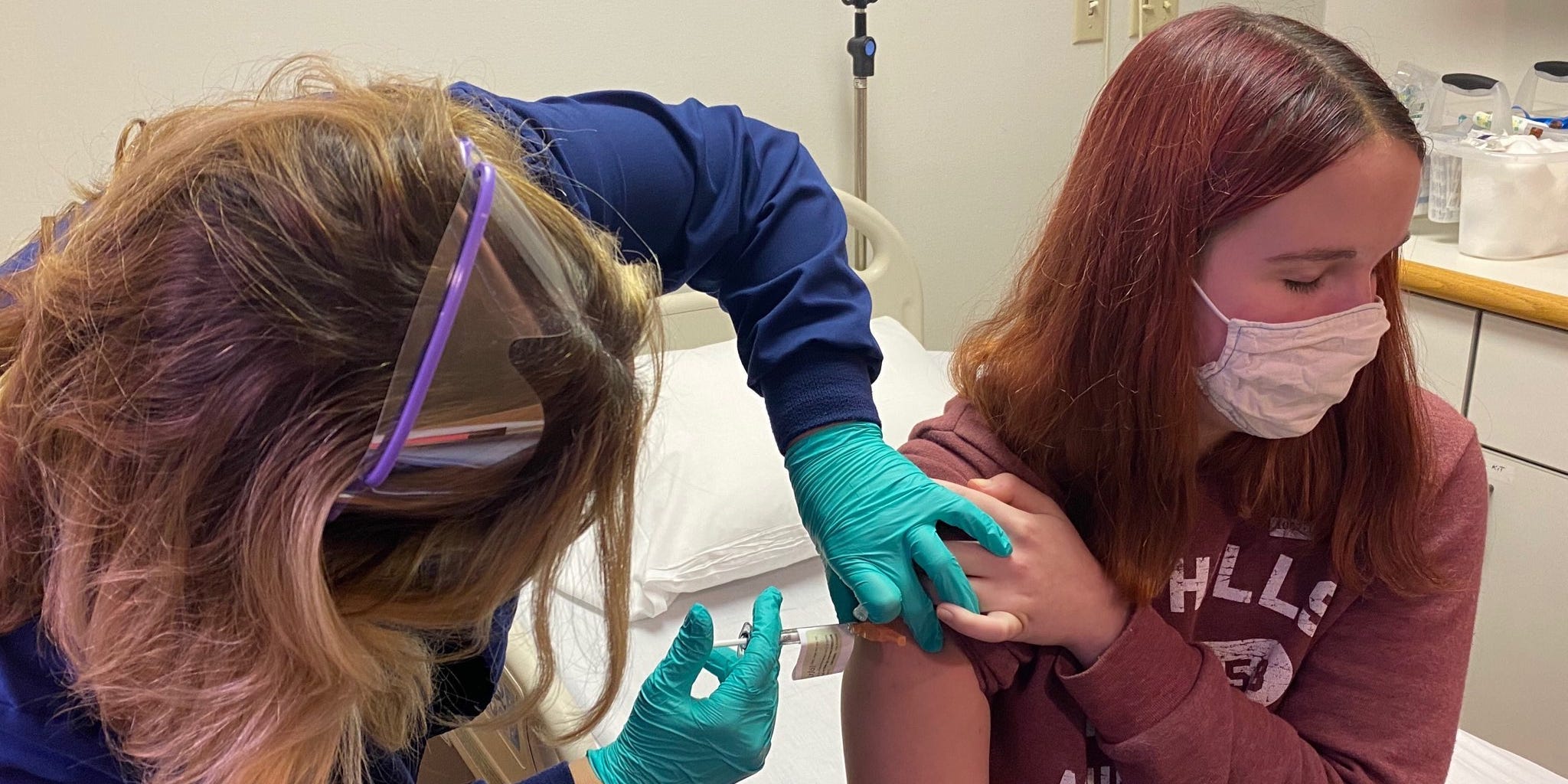
Cincinnati Children’s Hospital
- Massive studies have shown that two leading coronavirus vaccines are highly effective at preventing people from getting sick with COVID-19, the disease caused by the coronavirus.
- Top researchers are already pitching plans for additional studies, Business Insider has learned.
- This research aims to answer a critical question: can these experimental shots also prevent transmission of the virus, particularly asymptomatic infections?
- Key barriers to these studies are getting funding and getting vaccine developers Pfizer or Moderna on board.
- Dr. Larry Corey, a virologist at the Fred Hutchinson Cancer Research Center, is leading the proposal. He told Business Insider these studies could start in January and produce results by May.
- The findings would inform our understanding of the benefits of the vaccines and help determine how long the public needs to keep wearing masks and socially distancing.
- For more stories like this, sign up here for Business Insider’s daily healthcare newsletter.
Leading vaccine researchers are hoping to launch an ambitious study as soon as possible to answer a crucial question about coronavirus vaccines: can they stop the spread of the novel virus.
Two vaccines from Pfizer and from Moderna are highly effective at protecting people from getting sick with COVID-19, according to late-stage study results the companies announced in November. But the trials don’t tell us whether the vaccines help block the virus from infecting people or stop it from jumping from person to person.
“We have no knowledge about whether it prevents you from actually acquiring the infection at all,” Dr. Larry Corey, an influential virologist at the Fred Hutchinson Cancer Research Center, told Business Insider.
He’s now crafting a study he hopes will deliver an answer.

Fred Hutchinson
Corey’s proposal is to sign up thousands of students on college campuses across the nation starting in January. These volunteers would receive two doses of an experimental vaccine, either Moderna’s or Pfizer’s, or placebo injections.
The students would then go about their lives, as researchers test them for COVID-19 either every day or every other day and take routine blood draws.
In the first vaccine trials, volunteers only got tested for the coronavirus if they experienced symptoms. By testing everyone daily, the researchers will be able to spot asymptomatic infections, and prove whether the vaccines can prevent those as well.
An answer to that question matters a lot for controlling this pandemic.
New vaccine trials would tell us how long we need to keep wearing masks
While the elderly are at the greatest risk of getting seriously ill from this virus, most of the viral spread stems from younger people, who often don't have symptoms. Asymptomatic carriers can unknowingly spread the virus to more vulnerable people, worsening the public-health crisis.
The information will also help determine how long people will have to wear masks and socially distance, even as vaccines are rolled out.
Corey recently pitched this trial idea to a public-private partnership called Accelerating COVID-19 Therapeutic Interventions and Vaccines, or ACTIV. The group is a mix of top experts from government, academia, and the drug industry that has guided the most important US research on vaccines and therapeutics.
The proposal received "enthusiastic scientific support," Corey said.
"We know if it reduces infectivity, the public-health benefit goes up spectacularly," Corey said in a November 25 phone interview. "It is, we think, a very important thing to know and to know quickly."
Supporters of the plan say the study could wrap up by May, neatly aligning with the length of the spring semester at most universities.
That timeline could also help dodge a thorny ethical question.
If an effective vaccine is widely available, it'd be difficult to justify withholding it from some people to conduct an experiment. But young and healthy college kids won't be a priority group to get the vaccine as long as supplies are limited. Public-health authorities don't expect a COVID-19 shot to be widely available until late-spring or early summer, lining up nicely with the timeline for this trial idea.
The trial is still a proposal, needing funding and an industry partner
The plans are not final and still need funding and buy-in from the drug industry.
Moderna and Pfizer did not respond to specific questions about this proposal. Moderna spokesperson Ray Jordan said the biotech has no data at the moment "that would be informative on asymptomatic transmission."
Moderna Chief Medical Officer Tal Zaks told Axios that while he believes it's likely that his company's vaccine does prevent transmission, there's still no solid proof of that. And he cautioned that people shouldn't change their behavior after being vaccinated.
"When we start the deployment of this vaccine we will not have sufficient concrete data to prove that this vaccine reduces transmission," he said.
Pfizer didn't respond to a request for comment.
The study would be expensive to run, but Corey said funding isn't his top concern. The most critical hurdle is convincing Moderna or Pfizer to participate and provide vaccines.
Dr. Myron Cohen, a University of North Carolina virologist who supports the plan and is a member of the ACTIV group, said that the study could raise questions about whether it's the best use of a limited supply of vaccines.
"We'd be vaccinating subjects who aren't of the highest risk," Cohen said.
Finally, the study would need to enroll people at campuses that actually aim to bring students back in-person next semester. Corey estimated the trial would likely need to tally somewhere around 100 or 150 infections among volunteers to produce solid data.
That means if participants are too good at being careful and not getting exposed to the virus, it could take longer than anticipated to get results.
The findings could impact vaccination campaigns and better define the vaccine's benefits
The study could advance the scientific community's understanding of these vaccines in other ways, said Dr. Paul Offit, a vaccine researcher at the University of Pennsylvania. For instance, they could measure how much virus people discharge, and whether the vaccines help reduce that amount.

Paul Offit
The findings could also shape massive public-health programs, including awareness campaigns that encourage people to get vaccinated.
Information on how the vaccines affect the spread of the virus would help us figure out what proportion of the population needs to be vaccinated in order to halt the coronavirus' spread, said Dr. Douglas Lowy, a principal deputy director at the National Cancer Institute and a member of the ACTIV working group.

NCI
A randomized trial is best way to find the transmission answer, scientists say
The idea for an infectivity trial has been in the works since the spring, said Lowy, who helped develop the human papillomavirus vaccine. Lowy said he's been talking with Corey about the idea since then, knowing that the initial studies would focus more on a vaccine's impact against disease rather than transmission.
Cohen, the UNC virologist, said that even if such a study winds up not happening, scientists will still be keen to understand the vaccine's impact on viral spread.
Researchers would likely lean on surveillance data from the real-world rollout of the shots to see if they can see an impact. That data may offer clues about protection, but not a definitive answer, Cohen said.
Next 2 weeks will tell if this is 'really going to happen'
Another question Cohen raised: Is it worth the effort to launch such an ambitious study, given that the vaccines are expected to be rolled out either way?
By way of answering, Cohen recalled a landmark research finding he made on HIV. Cohen spent 20 years trying to see if HIV treatments stopped people from being contagious.
Despite facing skepticism that such a study should, or could, be run, Cohen's team carried on. When the findings were published, "the world changed overnight," he recalled. They found people were no longer contagious after being treated.
"When you provide people more information with more intensity and credibility, it has a pretty big effect," he said.
Corey said that there's no good alternative to running a rigorous study to answer the transmission question. He advised against trying to extrapolate findings from other vaccines.
While the trial is still just a proposal, Cohen said it's far enough along to be seriously considered.
"We are way downstream on exploring it. It's way past the 'kinda laugh' phase," he said. "We have to decide in the next two weeks, is this really going to happen."

